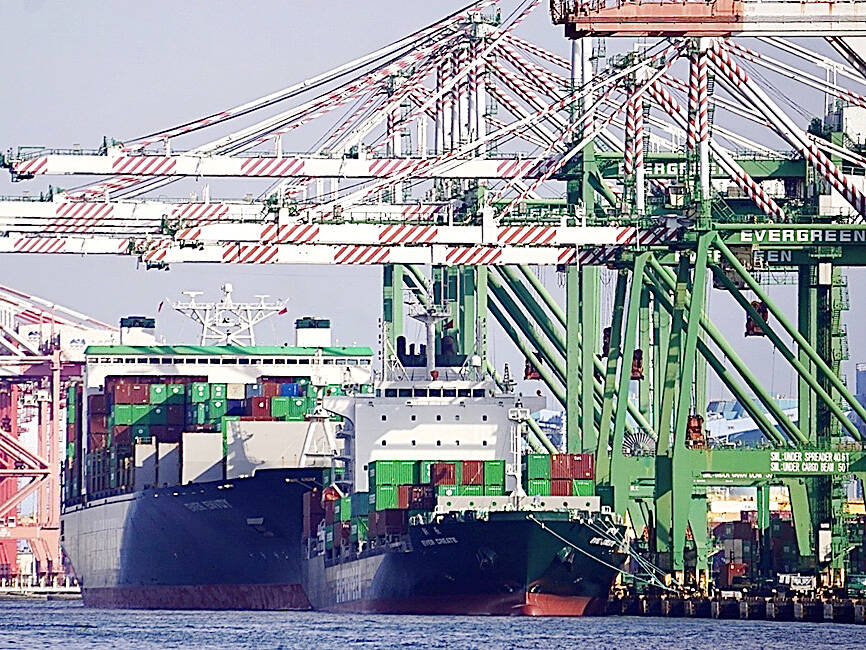Taiwan’s exports totaled US$479.4 billion last year, accounting for 1.9 percent of global volume, or 17th in the world, down one place from a year earlier, the Ministry of Finance said yesterday, citing WTO data.
The drop in ranking came amid an increase in global trade by 11.5 percent to US$24.9 trillion, despite a global slowdown induced by inflation and monetary tightening, the ministry said.
China retained first place with a trade volume of US$3.59 trillion, or a 14.4 percent share, followed by the US at US$2.06 trillion, Germany’s US$1.66 trillion, Japan’s US$746.9 billion and South Korea’s US$683.6 billion, it said.

Photo: CNA
Hong Kong ranked 10th with US$609.9 billion and Singapore was 16th with US$515.8 billion, putting Taiwan behind major trade rivals.
China in 2009 overtook Germany and the US as the world’s largest exporter, as it has grown to become a major part of global supply chains due to its demographic advantages, the ministry said.
China retained its top spot despite COVID-19 lockdowns of major Chinese cities for most of last year.
Taiwan’s global share of exports rose 0.3 percentage points, while Japan and Germany lost ground, the ministry said.
Taiwan, home to the world’s largest chip suppliers, has been affected by a global inventory adjustment cycle for technology products since the second half of last year, it said.
The US topped the list of nations for most imports followed by China, Germany, the Netherlands and Japan, it said.

RUN IT BACK: A succesful first project working with hyperscalers to design chips encouraged MediaTek to start a second project, aiming to hit stride in 2028 MediaTek Inc (聯發科), the world’s biggest smartphone chip supplier, yesterday said it is engaging a second hyperscaler to help design artificial intelligence (AI) accelerators used in data centers following a similar project expected to generate revenue streams soon. The first AI accelerator project is to bring in US$1 billion revenue next year and several billion US dollars more in 2027, MediaTek chief executive officer Rick Tsai (蔡力行) told a virtual investor conference yesterday. The second AI accelerator project is expected to contribute to revenue beginning in 2028, Tsai said. MediaTek yesterday raised its revenue forecast for the global AI accelerator used

Taiwan Semiconductor Manufacturing Co (TSMC, 台積電) has secured three construction permits for its plan to build a state-of-the-art A14 wafer fab in Taichung, and is likely to start construction soon, the Central Taiwan Science Park Bureau said yesterday. Speaking with CNA, Wang Chun-chieh (王俊傑), deputy director general of the science park bureau, said the world’s largest contract chipmaker has received three construction permits — one to build a fab to roll out sophisticated chips, another to build a central utility plant to provide water and electricity for the facility and the other to build three office buildings. With the three permits, TSMC

TEMPORARY TRUCE: China has made concessions to ease rare earth trade controls, among others, while Washington holds fire on a 100% tariff on all Chinese goods China is effectively suspending implementation of additional export controls on rare earth metals and terminating investigations targeting US companies in the semiconductor supply chain, the White House announced. The White House on Saturday issued a fact sheet outlining some details of the trade pact agreed to earlier in the week by US President Donald Trump and Chinese President Xi Jinping (習近平) that aimed to ease tensions between the world’s two largest economies. Under the deal, China is to issue general licenses valid for exports of rare earths, gallium, germanium, antimony and graphite “for the benefit of US end users and their suppliers

Dutch chipmaker Nexperia BV’s China unit yesterday said that it had established sufficient inventories of finished goods and works-in-progress, and that its supply chain remained secure and stable after its parent halted wafer supplies. The Dutch company suspended supplies of wafers to its Chinese assembly plant a week ago, calling it “a direct consequence of the local management’s recent failure to comply with the agreed contractual payment terms,” Reuters reported on Friday last week. Its China unit called Nexperia’s suspension “unilateral” and “extremely irresponsible,” adding that the Dutch parent’s claim about contractual payment was “misleading and highly deceptive,” according to a statement